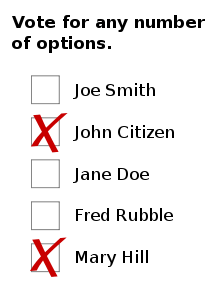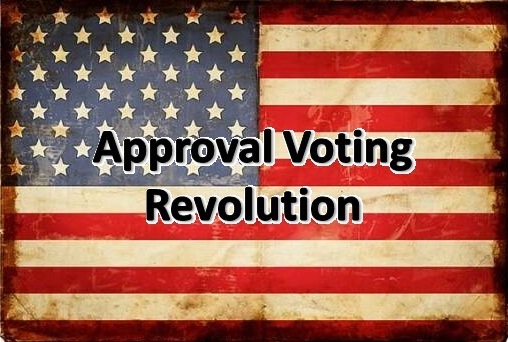https://www.youtube.com/watch?v=rCWjioIlVis
New movement challenging validity of plurality voting system in favor of Approval Voting reform
Democracy, elections, and voting at Democracy Chronicles
The American political system is in dire need of reform and elections are the essential institution where reform can bring better government. But while many election reform proposals focus on a fix that returns the country to a system like that envisioned by the founders, others have argued for a push towards more radical reform. A new movement is challenging the validity of the plurality voting system that is used across the world in favor of Approval Voting. Support for this radical yet simple change in elections is growing strong.

According to the Center for Election Science, “Approval Voting is a voting method that allows voters to vote for any number of candidates. The candidate with the most votes wins. Approval Voting is most often discussed in the context of single-winner elections, but variations can also be applied to multi-winner “at large” elections.” Support for Approval Voting has exploded since the system was described by Guy Ottewell in 1976 and by Robert J. Weber, who is believed to have first coined the term “approval voting.” More work was published in 1978 by the famous American game theorist and political scientist Steven Brams and mathematician Peter Fishburn.
Guy Ottewell’s famous work on the subject has been widely cited in the growing election method reform community ever since. Some of Ottewell’s earliest arguments for Approval Voting in England remain valid today:
It is “a fact of political life”; it is “the voter’s dilemma.” Heads are shaken over it at almost every election. It is used: there are many instances in which one side has encouraged extra candidates to run on the other side, even “planted” them there, in order to divide that side. Or, conversely, a side “undivides”: Labour and the Liberal Democrats make a pact not to run against each other in certain constituencies, so that they each will have more chance of beating the Conservatives; this is called “tactical voting.” Because it is known and exploited, do we have to accept it?
Also, Ottwell argued for Approval Voting internationally pointing out the status of Approval Voting even at the time he was writing:
Approval voting was actually used in Massachusetts in the eighteenth century. Members of the United Nations Security Council are allowed to vote for more than one candidate for Secretary General. In a typical election for 12 members of a board, there are, say, 19 nominees and the instructions are to “Vote for up to 12”; and it is not clear that anything would be lost by letting voters vote for any number.
Renewed Urgency at Center for Election Science
Recently, with the support of citizen led initiatives and the internet, Approval Voting is gaining support in new circles raising hope for progress among the passionate community of Approval Voting activists. Particularly noteworthy in the United States is the Center for Election Science, an Approval Voting advocacy group that recently produced a video appeal. Take a look at that video at the top of this article if you haven’t already. They are still looking for votes to win the Looking@Democracy Contest:
After a successful fundraising campaign, we finally have our Approval Voting video. Excitingly, we have also entered the video in the Looking@Democracy contest. This contest has entrants demonstrate innovative approaches to improving US government. Public voting has begun and continues through May 16th. We could really use your support. Winners for the public choice award and from judges will be announced on June 7th.
And really, how would Approval Voting not improve US government? It fixes the spoiler effect. You get better winners. And losers get a more accurate reflection of support. Consequently, this broadens the dialogue and leads towards more competitive elections. And it’s so easy! This is a no brainer. The first prize is $25,000, which would really help us grow. This is a great position to be in.
The campaign has already earned crucial support. According to a recent article on the Center for Election Science website, “Guy Ottewell is an early developer of Approval Voting, and it is an honor to have him as a supporter.” Democracy Chronicles has also been lucky enough to have been part of the growing discussion. For some time, American Democracy Chronicles writer and election method activist Michael Ossipoff has written about Approval Voting from all angles including in a unique article where he introduced a table of properties and criteria for comparing election methods in “DC Exclusive: Table of Election Method Properties and Criteria“. Also take a look at his most recent article, “How America Can Upgrade to a Better Democracy“.
Approval Voting in Motion
Perhaps most importantly for Approval Voting, new proposals in local and state governments in the United States have been gaining unprecedented support from unique circles. A push for Approval Voting in Arizona has been particularly successful. According to Ballot Access News editor and election reform expert Richard Winger:
On June 5, the Arizona Senate unanimously passed HB 2518. The bill originally gave authority for cities and towns to use Approval Voting for their own elections. The Senate amended it to set up a joint legislative committee to study approval voting for local elections. Now the bill goes back to the House.
Time will tell if the Arizona proposal gains ground but election reformers are not sitting on their hands. Frank Atwood is a Colorado Approval Voting advocate who made the following video for his own campaign:
In Texas, the resurgent Libertarian Party chooses its leaders with Approval Voting. According to one unsuccessful Libertarian candidate in Texas, Approval Voting needs to be more widely used:
At our state convention we had 6 candidates running for the nomination for US Senate. The delegates used Approval Voting to cast a vote for each candidate they liked. John Jay Myers was nominated without taking away votes from anyone else. Why aren’t our elections this way? I ran for County Commissioner in Precinct 3 against Republican Gerald Daugherty and incumbent Democrat Karen Huber. My 7,103 votes were triple the margin of Daugherty’s 61,726 votes to Huber’s 59,331 votes, a difference of 2,395. If I had not been on the ballot, Huber might have won. This is why legislators are always looking for way to remove Libertarians and other independent or third party candidates from the ballot. Instead of removing choices from the ballot, isn’t it better to have more choices and give you a fair way to express your preference?
The Libertarian Party is not the only grassroots insurgent political organization on the Approval Voting bandwagon. Occupy Wall Street and its worldwide affiliate organizations have been an integral part of the growing movement. Take a look at the podcast where Aaron Hamlin, President of the Center on Election Science and Democracy Chronicles’ writer interviews TJ Frawls, founder of the Occupy Wall Street Politics and Election Reform Working Group. According to TJ Frawls:
The group was started up in late September 2011 with the intention of brainstorming ideas for political and electoral reform that can break open the two-party duopoly in government. What can we do to reform the electoral system to create a more representative government? So, the first thing we did was just brainstorm ideas and proposals. And what came out of that was a document called, “People Before Parties,” that provides for 11 or 12 recommendations for electoral reform that we think would do this. Recommendations look for things like alternative voting methods, independent nonpartisan redistricting, smaller and more localized districts (which would mean more representatives in government), proportional representation, expansion of franchise, ballot access reform, primary election reform, initiatives and referrenda, and so on.
And so we worked on that for about two months. And then after that, an idea had been percolating within the group for awhile to conduct some kind of experiment that would look at alternative voting methods when you put them side by side with Plurality. There are about a dozen locals or towns across the country that have already implemented alternative voting methods of some sort. So we saw that as a big plus as a way to work from the ground up rather than from the top down. So you don’t have to go through the Congress. You don’t need the president’s approval. You don’t even need your state legislature’s approval. This is something people can do in their own towns.

Dave Russell says
Arizona House Bill 2518
What Senator Gail Griffin is not telling you about this bill and her floor amendment. A large portion of the Griffin floor amendment is nothing more than failed HB 2513 which was vetoed by Governor Brewer in 2012 and the failure of HB 2371 and HB 2135 which did not move this year because of strong opposition.
This bill has nothing to do with homeowner rights, choice or trashcans. The Griffin amendment would prevent future HOA’s from requiring tenant screenings and photo identification on prospective tenants and will disallow HOA’s and Planned Communities from setting restrictions on rental units such as; No sex offenders, convicted felons and drug dealers in rental units.
Further, this bill and the Griffin floor amendment will affect FHA approval for many communities across the state. By allowing all homeowners to rent their units, without restrictions and regardless of the associations rules or rental caps many HOA’s and Planned Communities will fall short of the 51% owner to rental ratio required by FHA/HUD. This will most defiantly disenfranchise the first time home buyer and has the potential to turn condominium communities into nothing more than crime-ridden apartment complexes.
Attaching this floor amendment to a seemingly harmless bill is simply another sneaky trick which our legislators are well noted for. Every sponsor of these failed bills are either Realtors and/or have ties to National Association of Residential Property Managers (NARPM). After the housing market crash many Realtors are now managing rental units to fill in the gaps.
So what is the motive for this bill and the Griffin amendment? Its certainly not about choice or trashcans! Simply put NARPM and the Arizona Association of Realtors are using their friends in the House (Michelle Ugenti) and Senate (Gail Griffin) to make their work easy and profitable at the cost of homeowners across the state. They simply want to rent units to anyone regardless of their criminal history or any association rules.
Myself, and my constituents strongly believe that if this bill and the Griffin amendment passes, it will simply pave the way to include existing HOA’s and Planned Communities next year. This bill will no doubt eliminate crime prevention programs in many existing and future HOA’s and Planned Communities.
Potential homeowners have choices. If you don’t like HOA’s don’t move into one. Senator Griffin would like you to believe that there is some sort of shortage in homes without an HOA attached ( Not true). Potential homeowners have the choice to contact the HOA and ask for their rules and regulations before they purchase. They also have the choice to ask residents in the community how they get along with their HOA.
The Griffin amendment is dangerous and will disenfranchise the potential first time homeowners applying for FHA/HUD Loans for decades. If your are in doubt that any information in this post is incorrect….please match the facts to the bill and the Griffin amendment.
https://www.azleg.gov/legtext/51leg/1r/bills/hb2518s.pdf